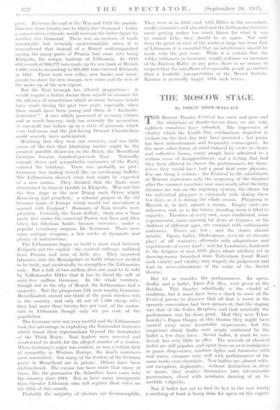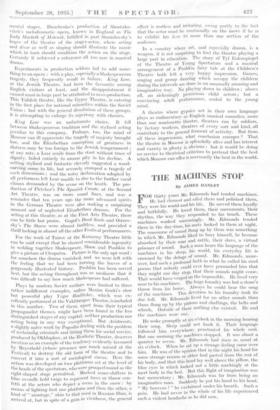THE MOSCOW STAGE
By PHILIP HOPE-WALLACE
THE Moscow Theatre Festival has come and gone and . the ululations of theatre-lovers from, we are told, eighteen countries have subsided. The impression of vitality which. the Youth Day celebrations imparted to visitors on the first day may have persisted ; but praise has been indiscriminate and frequently extravagant. In the more sober frame of. mind induced by visits to clinics and collective larms,..many people have admitted to a certain sense of disappointment, and a feeling that had they been allowed to choose the performances for them- selves they would have had a good deal more pleasure. For one thing is certain tho Festival .to the inhabitants of Moscow represents only. the reopening of. the theatres after the summer_ vacation ;. and since nearly allof the forty theatres are run -on the repertory system, the-choice for the individual playgoer is extremely wide during, these ten days, as it is during the whole season. Playgoing in Moscow. is, in I fact, almost . a. mania. Empty. seats are unknown, and, as • in the trains, standing romw is filled to capacity. Theatres of. every sort, some-traditional, some experimental, some catering for Jews or Gypsies, or for children of different ages, are crowded with enthusiastic audiences. Prices are low and the choice almost infinite. Opera, ballet, Shakespeare, revivals of obscure plays of all centuries, alternate. with adaptations. and experiments of every kind ; and for LondOners, hardened to the fatigues of neat little plays about adultery set in drawing-rooms furnished from Tottenham Court Road, such variety and vitality may stupefy the .judgement and lead to over-estimations of the value of the. Soviet theatre.
But let us, consider the performances. An opera, Sadko, and a ballet, Three Fat Men, were given at the Bolshoi.. This theatre admittedly is the . citadel of tradition, but it must have been a shock to some of the Festival guests to discover that all that is worst in the operatic convention had been preserved, that the staging was that of the Folies Bergeres, and that musically the performance was far from good. Had they seen Tchai-, kowsky's Eugen Onegin at this theatre they might have carried away more favourable impressions, but the suspicions ,about Sadko were amply confirmed by the ballet a few days later. Soviet ballet, it must be con- fessed, has very little to offer. The revivals of classical ballet are still popular, and apart from an over-indulgence in gauze drop-scenes, rainbow lights and fountains with real water,.compare very well with performances of, the same works seen elsewhere. New ballets are, almost with- out exception, deplorable : without distinction in decor or music, they .resolve . themselves into interminable pantomimes, sliced with acrobatic dancing of an in- credible vulgarity. .
But if ballet • has yet to find its feet in the new world,. s2mething, at least is being done for opera on- the _experi, mental stages. Danchenko's production of Shostako- viteh's melodramatic opera, known in England as The Lady Macbeth of Mstensk, fulfilled in part Stanislaysky's hopes of the theatre of the singer-actor, where acting and decor as well as singing should illustrate the music which in turn should condition the action on the stage. Certainly it achieved a coherence all too rare in musical drama.
Experiments in production seldom fail to add some- thing to an opera : with a play, especially a Shakespearean tragedy, they frequently result in failure. King Lear, at the Jewish Theatre, had been the favourite among English visitors at least, and the disappointment it caused must in large part be attributed to over-production. This Yiddish theatre, like the Gypsy Theatre, is catering in the first place for national minorities within the Soviet Union ; but with the general dissolution of these groups, it is attempting to enlarge its repertory with classics.
King Lear was an unfortunate choice. It fell between Shakespearean tradition and the stylised acting Peculiar to this company. Perhaps, too, the mind of Moscow can ill appreciate the tragedy of majesty brought low, and the Elizabethan conception of greatness in distress may be too foreign to the Jewish temperament ; at any rate, a Lear senile from the start without trace of dignity, failed entirely to arouse pity in his decline. A setting stylised and fantastic cleverly suggested a wood- carving come to life, but severely cramped a tragedy of such dimensions ; and the noisy declamation adopted by all performers left Lear unable to rise to the further vocal climax demanded by the scene on the heath. The pro- duction of Fletcher's The Spanish Curate, at the Second Art Theatre, was on more usual lines, and was a reminder that ten years ago the more advanced spirits in the German Theatre were also making a surprising amount out of neglected Elizabethan dramas. For the acting at this theatre, as at the First Arts Theatre, there Can be little but praise. Gogol's Dead Souls and Ostrov- sky's The Storm were almost faultless, and provided a thrill lacking in almost all the other Festival performances.
For the work of Tairov at the Kamerny Theatre little can be said except that he showed considerable ingenuity in welding together Shakespeare, Shaw and Pushkin to give a picture of Cleopatra. Picture is the only apt word : for somehow the drama vanished, and we were left with the feeling that we had been turning the leaves of a gorgeouslv. illustrated history. Pushkin has been served. best, but the acting throughout was so mediocre that it was difficult to say how much Shakespeare had suffered.
Plays by modern Soviet authors were limited to three Lather indifferent examples, unless Maxim Gorki's slow but powerful play Yegor Boulitchev, which was ex- cellently performed at the Vakhtangov Theatre; is included in this number. Two of them, apart from their typical propagandist themes, might have been found in the less distinguished stages of any capital, neither production nor acting being in any way exceptional. But Aristocrats, a slightly naïve work by Pogodin dealing with the problem of reclaiming criminals and fitting them for social service, produced by Okhlopkov, at the Realistic Theatre, deserves location as an example of the tendency evidently favoured by Meyerhold (whose presence was much missed at the Festival) to destroy the old form of the theatre and to convert it into a sort of sociological circus. Here the action was developed on two platforms set at the level of the heads of the spectators, who were grouped round as the eight-shaped stage permitted. Masked scanc-shifters in blue overalls hold twigs to represent trees or throw con- fetti at the actors who depict a scene in the snow : by means of lighting first one platform and then the other, a kind of " montage," akin to that used in Russian films, is arrived at, but in spite of a gain in • vividness, the general effect is restless and irritating, owing partly to the fact that the actor must be continually on the move if he is to exhibit his face to more than one section of the audience.
In a country where art, and especially drama, is a weapon, it is not surprising to find the theatre playing a large part in education. The story of Tyl Eulenspiegel at the Theatre of Young Spectators and a musical arrangement of a Pushkin fairy tale at the Children's Theatre both left a very happy impression. Games, singing and group dancing which occupy the children during the intervals are done in an unusually amusing and No playing down to children ; above imaginative way. all, no sickeningly precocious child actors ; but a convincing adult performance, sealed to the young mind.
A theatre where gypsies act in their own language plays as rudimentary as English musical comedies, more than one marionette theatre, theatres run by soldiers, by factory workers, theatres of every sort and . kind, all contribute to the general ferment of activity. But from all these impressions, what conclusion emerges ? That the theatre in Moscow is splendidly alive and has interest and variety in- plenty is obvious : but it would be doing no service to theatrical criticism to pretend that the best which Moscow can offer is necessarily the best in the world.







































 Previous page
Previous page